D.B. Jackson's Blog, page 9
June 5, 2023
Monday Musings: Contemplating The Cosmos Again (Or Is It “Still”?)
I am just back from a weekend in Charlotte, where I attended ConCarolinas. This only a few days after my return from Wyoming/Colorado. It’s been a whirlwind couple of weeks, and convention season is far from over.
But my thoughts remain fixed on the wondrous days I spent at the Launch Pad Workshop in Laramie that I wrote about in last week’s post. Launch Pad is intended to educate creators so that when they introduce concepts related to astronomy and space travel to their work, they do so in an informed, accurate way. The workshop does far more that that, however, at least it has for me. It has made me think in different ways about a host of issues and questions. Last week, I focused on the new urgency and moral weight with which it has infused my thinking regarding global climate change.
This week, my thoughts have been trending in a somewhat different direction.
It is a given of astronomical thinking, and also of physical and chemical law, that all the matter found in the universe today was formed at the time of the Big Bang. The vast majority of that matter exists now in the form of hydrogen and helium — the latter is produced, along with energy, by the fusion of hydrogen atoms in stars. Hydrogen, the lightest element, accounts for 73% of all the matter in the universe. Helium accounts for 25%. All the other known elements combined account for the remaining 2%. That’s all. Two percent. Proving once again that stars are big, and there are a lot of them.
This, though, is not the point I am trying to make.

A dying star. Credit: NASA, ESA and the Hubble SM4 ERO Team
When stars are formed, and when stars die, other elements are created by the tremendous pressure and energy produced by extreme gravitational forces. I won’t attempt to go into the physics of this because I am fated to screw it up in some way, inviting ridicule and undermining the larger purpose of this post. You’ll just have to trust me on this, and also on the rest of what I’m going to say. Namely . . . .
There is, in the birth, life, and death of a star, a circularity of consumption and production of elements and resources that mirrors what we see in, say, the death of a tree in a primeval forest. Nothing is lost; everything from the old goes into creating new star “life” — new energy and mass — just as every component of the downed tree infuses the soil with nutrients for new saplings. Probably this is self-evident, but I believe it is worth noting nevertheless. Ecology of this sort, whether on the scale of trees or of stars, is elegant in its efficiency, beautiful in its symmetry.
Combine this with the sheer size of stars and galaxies, and we are confronted once more with the relative insignificance of our own world. Yes, we have polluted and scarred our world. We risk poisoning ourselves — our food, our water, our air — and rendering our world uninhabitable. But the universe will go on. Long, long, long after we as a species are gone, our planet will be consumed by our dying sun and all that we are and all that we leave behind will be reclaimed by the universe and used to create new stars, new planets, perhaps new life.
This past weekend at the convention, though, a conversation among friends turned to the question of what happens to us as individuals when we die. Now, I am not a religious person. I don’t believe in an afterlife. I don’t believe in heaven or hell. I don’t believe in reincarnation. But the universe is filled with the unexplainable, the unfathomable. There are forms of matter and energy that the smartest minds on the planet have yet to figure out fully — dark matter and dark energy, quarks and gluons. We have so much yet to learn.
So, who is to say what happens to our spirit, what some might refer to as our soul? Does it exist? I don’t know. And if it does, I don’t know what form it would take, though I expect it would be more energy than matter. But energy and matter both are subject to laws of conservation. They can’t be lost or gained. They continue, and have since the Big Bang.
And if closed, circular, conserving systems govern what happens to the smallest of creatures and plants, to the great Sequoias of Pacific forests — the largest living things on Earth — to planets and stars and galaxies, mightn’t they also govern what happens to us? Not only our bodies, but our essences? I’m not trying to get all metaphysical here. Really, I’m not. I’m not saying “This is.” But after all the mind-blowing stuff I learned at Launch Pad, I do find myself saying, with ever more frequency, “Couldn’t this be?”
Have a great week.
May 29, 2023
Monday Musings: Coming Home From Launch Pad, and Contemplating the Cosmos
I spent last week at the University of Wyoming in Laramie, attending the Launch Pad Astronomy Workshop. Launch Pad is the brainchild of Mike Brotherton, a science fiction writer who also happens to be a professor of Astronomy at U of W, and Jim Verley, also a professor at Wyoming. They started the workshop back in 2007, basically because they had grown tired of reading bad space science in SF novels and of seeing bad space science in SF movies. The idea of the workshop is to bring together small groups of writers and literary industry professionals and give them a crash course in astrophysics. Along the way, Mike and his current fellow instructors — Christian Ready, an astronomer at Towson University who has worked on the Hubble and James Webb Space Telescope projects, and Theodora Zastrocky, one of Mike’s graduate students — hope to correct longstanding misconceptions about how space “works,” and impart to the workshop attendees some of their passion for all things astronomical.
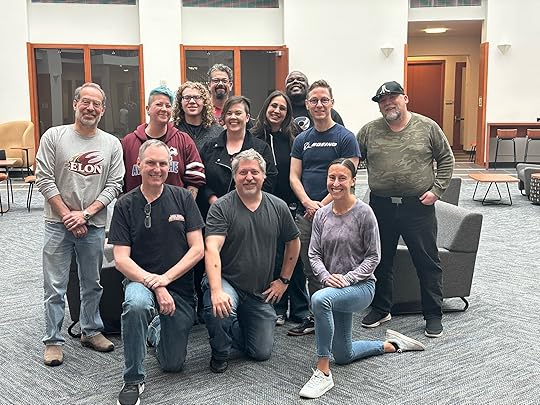 I applied for the workshop back in March, and was fortunate to be accepted along with a group of eight other writers, all of them intelligent, inquisitive, totally engaged, and eager to learn. It was an amazing week, filled with fascinating lectures, wide-ranging discussions, and very cool demonstrations. We learned a ton, laughed even more, and benefitted from the awesome knowledge and enthusiasm of our three teachers. The weather in Wyoming was a bit uncooperative, denying us the opportunity to spend an evening looking through telescopes, but otherwise the week was all we could have hoped for.
I applied for the workshop back in March, and was fortunate to be accepted along with a group of eight other writers, all of them intelligent, inquisitive, totally engaged, and eager to learn. It was an amazing week, filled with fascinating lectures, wide-ranging discussions, and very cool demonstrations. We learned a ton, laughed even more, and benefitted from the awesome knowledge and enthusiasm of our three teachers. The weather in Wyoming was a bit uncooperative, denying us the opportunity to spend an evening looking through telescopes, but otherwise the week was all we could have hoped for.
This is a Monday Musings post, of course, and so part of my purpose in writing about the workshop is to share with you some of what I’m considering as I make my way home from Wyoming. And honestly, I’m not certain where to start.
I suppose I should begin where the week’s curriculum began, because it really is fundamental to everything else: Space is really big.
Yeah, that’s obvious. At least I thought it was when Mike said it at the start of his first lecture. I was kind of cavalier about it, actually. “I know that. Everyone knows that. They sure are starting off with basics . . . .” Except, of course, I had no idea. None. The idea that space is big is both completely obvious and utterly incomprehensible. It is big on a scale that defies logic and understanding. And despite all the cool space photos and well-explained charts Mike and Christian and Theodora shared with us, I didn’t really get it until Day 4 of the workshop.
We were talking about galaxies at that point, defining different types and discussing how they form and interact with one another. And whoever was lecturing that day — I believe it was Theodora — put up on the screen yet another stunning image from the Hubble Space Telescope. It’s an image of a spiral galaxy viewed “edge-on,” so that the galaxy appears relatively flat except for the bright bulge at the center. Theodora explained that while the spiral arms of the galaxy are home to relatively new stars, like our sun, older stars are clustered in that bright center.
And suddenly, the scale of space hit me.

Credit: ESA/Hubble & NASA, D. Rosario
You can see the image here. That central bright spot is a tiny part of the galaxy. And it is filled with stars, none of them all that close to one another. In fact, the closest star to our own sun is 4.25 light years away. That’s 25,300,000,000,000 miles. Each star in the pictured galaxy is, quite likely, the center of its own solar system. And every one of those solar systems is probably comparable in scale to our own.
Here is a face-on image of another spiral galaxy to give a sense of the structure.

Credit: NASA, ESA, S. Beckwith (STScI), and The Hubble Heritage Team (STScI/AURA)
Okay, now look at this third photo.

Credit: NASA, ESA, CSA, and STScI
This is an image from the James Webb Space Telescope of a tiny — and I mean TINY — portion of the sky. Look at all those galaxies, each one of them comparable to the ones in the previous images, each of them containing tens of billions, or even hundreds of billions of stars.
By now, you’re probably thinking, “Okay, David, we get. Space is big. So what?” Fair enough.
We look at the Grand Canyon and we marvel at how vast it is. We glimpse the Rockies, or the Cascades, or, if we’re truly fortunate, Kilimanjaro or the Himalayas, and we are awed by their majesty. We wonder (rightfully so) at the achievements to-date of NASA — journeys to the Moon, to Mars, to Jupiter, to the Kuiper Belt. Yet all of these things are minute. Our world is less than a speck. Our lives are less than flashes of light in the scope of spacetime that is our universe.
But our insignificance in the face of the hugeness of the universe is a cliché, and is sort of beside the point.
Everything that we are, every element and molecule in our world, in our lives, in our bodies, comes from the formation of the universe. It was all there in that first mysterious occurrence of creation known as the Big Bang. It has shaped us, as individuals, as societies and cultures, as a species. I’m not a religious person, but there is something miraculous in this. When I look at the vast scope of all that surrounds us in space, and I contemplate our infinitesimal world, I cannot help but be struck by the fragility of this world. We think of it as so very large. “The whole world.” It’s a phrase we use and hear from earliest childhood. In reality, that whole world is so very, very small.
That we exist at all is remarkable. We should be doing all we can — again, as individuals, as societies and cultures, as a species — to protect that miracle. Are there other worlds out there with life, with civilizations? Maybe. Probably. But we don’t know. And maybe we would be better served to assume there aren’t, that we’re alone.
We are, as a species, well on our way to blowing this, to fucking up our world beyond hope of repair or recovery. Hubris has very nearly destroyed us. The sort of hubris that ignores how enormous is the universe in which we live, and how insignificant a place in it our world holds.
Look at those photos again. Look at how gorgeous our universe is, our galaxy is. Look at a photo of the Grand Canyon. That’s pretty gorgeous, too, small though it might be. Beauty runs like a plot thread through the entirety of existence, from the dandelion growing in the green of our lawn to the spectacular galaxies that glow as far as science’s eye can see.
We owe it to ourselves and to those we love to spend our every breath making sure all that beauty is there for our children, and their children, and all the generations to come. The universe cares nothing for us. We are as dust to it. We are the ones who must save ourselves.
So, take a moment tonight to stare up into the stars, to appreciate the beauty of all you can see, and all you know is there but can’t spot with the naked eye. The universe is a wondrous place. But it won’t wait for us indefinitely.
May 24, 2023
Professional Wednesday: Another Letter To My Younger Self
Dear Younger Me,
Yes, it’s me again — Middle Aged David. Upper Middle Aged David, actually. I know I wrote to you earlier this week. I remember doing so. I’m not so far gone quite yet. But I thought you might benefit from a second letter focused on the professional side of things. As I told you on Monday, we did wind up having a career in writing, just as we dreamed when we were a kid. And, also as I told you, our professional life hasn’t followed precisely the path we envisioned. That’s fine. We’ve had a good ride so far. But there’s stuff you should know, stuff I wish I had known.
I suppose all of it can be summed up in two words — and I hate to resort to cliché, in a writing post no less, but it really is true. Shit happens. It does, it does, it does. And it has happened to us. More than once.
The biggest mistake I made — we made — early on was assuming our career trajectory would be linear, a progression toward greater and greater success, higher and higher advances, bigger and better sales numbers. That may be true for a select few, but for most writers a career follows a meandering, uncertain path. Some books and series are more successful than others — commercially and critically. I call that early expectation of ever-improving circumstance our biggest mistake not because it somehow led to a disappointing outcome for one project or another, but because it caused me — us — so much pain. When our career hit that first speed bump, I took it personally. I felt I had failed, and also that the industry had failed me. I was confused and angry and sad and, most of all, terrified at the thought that this first disappointment would mean the end of our professional journey. I didn’t yet understand the nature of a creative life.
And so I say to you, Younger Me, learn resilience. Grieve for those lofty unmet ambitions, but then move on and try again. Learn moderation. Don’t let commercial and critical success carry you too high, and don’t let poor results drive you too low. Success will follow failure, which will follow success, and so on. If you can — and I know it’s so, so hard — learn to let go of expectation entirely. We don’t know which books will soar and which will flop. We love them all, which is why we go to the extreme trouble of writing them in the first place. And finally, learn contentment. Love the stories you create on their own terms. Find success in the completion of a good tale, in the realization of an artistic vision.
Take every promise made to you by an editor and publisher with a grain of salt. It’s not that they don’t mean what they say. Okay, SOME of them don’t mean what they say. But mostly, they simply can’t anticipate all that might happen. Producing a book is no small feat. A thousand things can go wrong. Editors and publishers often tell us, as if gospel, that a certain thing is going to happen on a given date. And that is, at the moment, their best guess of what will happen. Pencil in the date. Don’t commit it to ink. Because, as we have established, shit happens.
 All those great ideas you have for jacket art? They’re not as great as you think they are. Seriously. We are a writer. And we’re very, very good at that. We are NOT a graphic artist. We are NOT a marketing expert. I remember when the first Thieftaker novel went into production, I had what I thought was SUCH a wonderful idea for the jacket art. A can’t miss idea. PERFECT for the book. It wasn’t any of those things. The moment I saw Chris McGrath’s image for the book, which WAS brilliant and wonderful and perfect, I understood that no one should ever put me — us — in charge of selecting jacket art.
All those great ideas you have for jacket art? They’re not as great as you think they are. Seriously. We are a writer. And we’re very, very good at that. We are NOT a graphic artist. We are NOT a marketing expert. I remember when the first Thieftaker novel went into production, I had what I thought was SUCH a wonderful idea for the jacket art. A can’t miss idea. PERFECT for the book. It wasn’t any of those things. The moment I saw Chris McGrath’s image for the book, which WAS brilliant and wonderful and perfect, I understood that no one should ever put me — us — in charge of selecting jacket art.
 On the other hand, do trust in your story ideas. All of them. Even the old ones that haven’t yet gone anywhere. At some point, you’ll have an idea for a story about three kids living in the subway tunnels beneath New York City. And you won’t have any idea what to do with it. You’ll give up on it. Don’t. It will become Invasives. At another time, you’ll write a story about two women interacting with Celtic deities and trying to protect an ancient, transcendently powerful magical artifact. That one, too, will seem to languish. Trust the story. That book just came out. It’s called The Chalice War: Stone. Believe in your vision.
On the other hand, do trust in your story ideas. All of them. Even the old ones that haven’t yet gone anywhere. At some point, you’ll have an idea for a story about three kids living in the subway tunnels beneath New York City. And you won’t have any idea what to do with it. You’ll give up on it. Don’t. It will become Invasives. At another time, you’ll write a story about two women interacting with Celtic deities and trying to protect an ancient, transcendently powerful magical artifact. That one, too, will seem to languish. Trust the story. That book just came out. It’s called The Chalice War: Stone. Believe in your vision.
If a publisher promises more than you think they can deliver, under terms that seem way too good to be believed, be skeptical. Very, very skeptical. Chances are, they CAN’T deliver. Chances are those terms can’t be met. We’ve been burned a couple of times. ’Nough said.
Over the past twenty-five-plus years, I have tried to thank Nancy every single day for making our career possible. And I’ll continue to thank her. But I might have missed a few days. Fill in the gaps, will you?
Most of all, keep doing what you’re doing and I’ll do the same. No, we haven’t gotten all we wanted, we haven’t achieved every goal. But we’re doing okay, and as much fun as you’ve been having early in our career, I’m having even more now. It keeps getting better.
And yes, the rumors are true. We’re editing now, and we like it. The dark side really is more powerful . . . .
Best wishes,
Older David
May 22, 2023
Monday Musings: A Letter To My Younger Self
Dear Younger Me,
Yes, that’s really our hairline now. Calm down. It’s not— Would you please calm down? Thank you. What did you expect? Seriously. Dad was bald. Bill and Jim had lost their hair by the time they were thirty. You thought we’d make it through middle age with hair like George Clooney’s? We didn’t make it through middle age with ANYTHING like George Clooney’s. On the bright side, our beard finally filled in, so there’s that . . . .
But this isn’t about how we look, thank goodness. This is a letter to you, my younger self, about other things I wish I had known when I was your age (whatever age that might be exactly). So read on, Younger Me, and if you happen to run across a time machine at some point, remember this stuff, okay?
Let’s start with this, because really nothing is more important: You know how you feel most of the time that you’ll always be alone, that you’ll never meet the right person? Well, I can assure you, you won’t be and you will. She is brilliant, caring, funny. She shares many of your interests and, more important, she shares your values. She is strong and insightful, charming and generous. And . . . What’s that? Yes, she actually loves you. I know: I couldn’t believe it either.
What?
[Sigh]
Yes, Younger Me, she’s also hot.
And together, we have two brilliant, strong, funny, beautiful daughters. You will be blown away.
More good news — and we can discuss this more on Wednesday: You will have that writing career you’ve been dreaming of since you were six. There will be a few detours along the way, some bumps and bruises. It won’t be exactly the career we imagined; it might not reach the heights to which we’ve aspired. But it’s our career. We made it, we sustained it (with the support and encouragement and love of the aforementioned life partner and children), we earned it. We should be proud of it.
Don’t know if you can do much about his one, but I should mention it — if, around 1993 or so you have a chance to get the rookie card of a Yankee prospect named Derek Jeter, go ahead and pick one up. Or ten. Or fifty. Slide it (them) into a nice plastic sleeve for protection and put it (them) away. Trust me, you’ll be glad you did.
You know those episodes we go through, and have since we were little — nausea, shaking hands, extreme ill-defined terror? Those aren’t normal. I know Dad used to tell us he experienced them, too, and he might well have been telling the truth. But that doesn’t mean they were routine or natural. He meant to reassure. He loved us and wanted to help. But by normalizing them, he kept us from doing something about them at a younger age. Along the same lines, you know how for so very long we brushed off our tendency toward unexplained worry and stress, saying that we were “high strung,” or some such? Turns out, that’s not high strung.
We have Generalized Anxiety Disorder, and we have Panic Disorder. And we didn’t need to suffer with either for nearly so long. Do something about them. Soon. Please. For our well being. Friends have encouraged us to try therapy. I finally did when we were 58. I wish we’d done it forty years sooner.
For your sake and mine, please work harder at the guitar. Yes, we still play. Yes, I’m better than you are, which is as it should be. But with work and practice, with less laziness and self-satisfaction, we could have been so good. I can’t have expected us to work at guitar the way we did at writing — one was a hobby, the other a profession — but a bit more work would have brought us such joy.
Never ever ever take your car to Toyota of Palo Alto. Just don’t.
Look at your book shelf, the one with all the fantasy novels on it. You’re going to wind up meeting nearly every author represented there. Many of them will become good friends. Yes, including Guy Gavriel Kay. Pretty cool, right?
Spend as much time as you can with Mom and Dad. Be as tolerant as you can be of Bill’s flaws and idiosyncrasies. Love them. Cherish them. We won’t have nearly as much time with them as we deserve, and we will miss them every day for the rest of our lives. I know, Mom and Dad can be annoying now and then, and occasionally Bill infuriates us. They’re family, and sometimes family is like that. But the hole their absence leaves in our life dwarfs these temporary frustrations. Extend to them the grace and forgiveness you would want from all those we love.
Those amazing friends we made at Brown, the ones who enriched our life there and made it the most memorable time of our early life? Yeah, they’re still our dear friends, still enriching our life. Treasure them.
The rest is pretty much common sense. Dial back the weed — we will later anyway; might as well preserve a memory or two. Don’t drink too much — you don’t hold your booze as well as you think you do. Exercise. Eat right. Take care of yourself. Life is precious, and we don’t want to miss a thing. Read more. Yes, we read a good deal. Read more. Trust me. No one ever looked back from the vantage point of their dotage and thought, “I wish I’d put all those books aside and watched more TV.” Be good to the people we love. Slow down and savor all those things we enjoy doing. Let go of grudges and jealousy and regrets. They do us no good.
Oh, and along the lines of that Derek Jeter thing — those people at Apple who early on made all those weird-looking, quirky computers? Turns out they were on to something. If you get a chance, buy a few shares . . . .
Best wishes,
Older David
May 17, 2023
Professional Wednesday: Looking At Our Old Work With Compassion
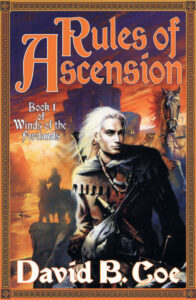 I continue to read through and revise the books of my Winds of the Forelands epic fantasy series, a five-book project first published by Tor Books in 2002-2007. The series has been out of print for some time now, and my goal is to edit all five volumes for concision and clarity, and then to re-release the series, either through a small press or by publishing them myself. I don’t yet have a target date for their re-release.
I continue to read through and revise the books of my Winds of the Forelands epic fantasy series, a five-book project first published by Tor Books in 2002-2007. The series has been out of print for some time now, and my goal is to edit all five volumes for concision and clarity, and then to re-release the series, either through a small press or by publishing them myself. I don’t yet have a target date for their re-release.
Last week, I wrote about the number of passages I have found in the first book, Rules of Ascension, that are repetitive or overly explanatory. My younger self had yet to learn the simple lesson of trusting one’s readers, and, by extension, trusting oneself. We often don’t need to tell our readers as much as we think we do. We can trust that the groundwork we have set in place will make clear the plot points, character backgrounds, and world building details we want our readers to grasp and remember.
In previous weeks, I have written about the excess verbiage we often put into our books, at the expense of flow, clarity, and effective story telling. And yes, I have found a great deal of this in Rules of Ascension as well. Too many adverbs, too much passive writing, too many dialogue tags. This was only my second series, and I was still learning to write.
This week, though, I would like to shift my focus a bit, and, in a way, give my younger self a break. Because despite the many, many flaws in my early prose, I am also finding some things to enjoy and even admire about this early work.
I suppose it might strike some as self-serving — even egotistical — to look back on earlier work and say, “I like this; this is good.” The truth is, I find myself grappling with self-criticism for even contemplating praising my own work. Hence this paragraph. But I had a text exchange the other day with a dear friend, someone I have known for decades. And he pointed out to me — in a somewhat different context — that extending ourselves grace and compassion, not to mention forgiveness and understanding, can be incredibly difficult, but also profoundly important.
 We are often our own most unrelenting critics. This is certainly true for me in other elements of my life. I am hard on myself. Too hard. And, on a professional level, I am the first to notice and criticize flaws in my writing. So reading through old books in preparation for re-release is often an exercise in self-flagellation. It was with the LonTobyn reissues that I did through Lore Seekers Press back in 2016. And it is again with the Winds of the Forelands books.
We are often our own most unrelenting critics. This is certainly true for me in other elements of my life. I am hard on myself. Too hard. And, on a professional level, I am the first to notice and criticize flaws in my writing. So reading through old books in preparation for re-release is often an exercise in self-flagellation. It was with the LonTobyn reissues that I did through Lore Seekers Press back in 2016. And it is again with the Winds of the Forelands books.
Then as now, I had to force myself to acknowledge the good in the novels. Because I was hyperaware of instances of clumsy prose and heavy-handed story telling. I still am.
But . . . .
The Winds of the Forelands books marked a turning point in my career. I had enjoyed some success with the LonTobyn Chronicle, and with this new project I wanted to take my writing to the next level. I challenged myself in several ways: I featured a protagonist who was, at least at the outset of the saga, really difficult to like. I built a world that was exponentially more complex and intricate than what I had constructed for LonTobyn. And I wove together numerous plot threads, creating an ambitious (and, I believe, ultimately successful) narrative that I wouldn’t have dared to attempt with my first series.
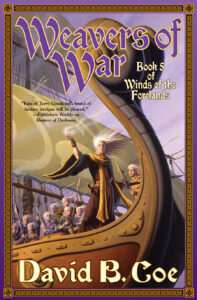 As I have read through this first book in the story, polishing and trimming the prose, I have rediscovered that narrative. I remember far less of it than I would have thought possible. Or rather, I recall scenes as I run across them, but I have not been able to anticipate the storyline as I expected I would. There are so many twists and turns, I simply couldn’t keep all of them in my head so many years (and books) later.
As I have read through this first book in the story, polishing and trimming the prose, I have rediscovered that narrative. I remember far less of it than I would have thought possible. Or rather, I recall scenes as I run across them, but I have not been able to anticipate the storyline as I expected I would. There are so many twists and turns, I simply couldn’t keep all of them in my head so many years (and books) later.
So, I constantly find myself thinking, “Oh! I forgot this! What a cool twist!” If I’m being honest, I have to say that it’s quite gratifying.
I have written here before about the importance of self-defining our successes. Artists in general, and writers in particular, are subject to business models and creative traditions that depend largely on external markers of success or failure. Royalty statements and sales numbers, print runs and new contracts, reviews in journals, reviews on Amazon, awards, etc. We look outside ourselves for affirmation. If it comes, great. But if it doesn’t, many of us label our latest endeavors “failures.” Or, worse, we label ourselves that way.
To my mind, one of the secrets to enjoying, or perhaps enduring, a career in writing, is learning to self-define what it means to succeed. We need to take satisfaction and a sense of accomplishment from the things we can control — hitting our deadlines, writing books we know are good, managing to craft that difficult scene or plot point in just the way we had envisioned.
Which brings me back to where I began. Rules of Ascension will benefit from the polishing I’ve done. The other four books in the series will be better when I complete similar revisions on them. But these are good books. They’re exciting, suspenseful, poignant. They’re written with passion and a keen eye for detail. The character work is strong, the plotting tight, the world building compelling.
I say this not to brag, but to affirm something I wish I’d been able to say as a young writer, too obsessed with those external measures of accomplishment to look beyond a poor review here or a disappointing sales report there: These books were a success. And I’m damn proud of them.
I look forward to reissuing them so you can enjoy them, too.
Keep writing!
May 15, 2023
Monday Musings: Reflections on College Graduation Weekend
This weekend, Nancy, as acting president of the university here, is presiding over her second, and last, college graduation. In July, a new president (or Vice Chancellor, as the president here is known) will take over, and Nancy will begin transitioning back to normal life. I look forward to her having more time, to her sleeping better, to her not carrying the weight of the world — or at least this entire little college town — on her shoulders.
But as we go to one graduation event after another — her as the Big Kahuna, me as her Arm Candy — I have been thinking back on my own college graduation, which took place nearly four decades (!) ago. I have incredibly fond memories of my college years, and of that weekend in particular, and yet I also remember my final days at Brown as deeply bittersweet. I find myself regarding this year’s crop of graduates with a blend of envy and sympathy.
Envy because they are all so young — no cholesterol medications or morning muscle aches or worries about the latest IRA statements from beleaguered brokerage houses for them! It’s a cliché, but it’s true: They have their whole lives ahead of them. They can go anywhere, do anything. Or at least they think they can, which is really the part that matters.
The sympathy, though — that’s where my thoughts have settled today. Because while I reject entirely the notion that “these are the best years of their lives,” I do acknowledge that they are saying goodbye to a unique and glorious interlude in their lives.
There is lots of debate in education circles these days about the necessity of a four-year, liberal arts education. Many believe — perhaps with some justification — that the traditional college experience isn’t for everyone, and that by trying to force every 18-year-old onto that path we do a disservice to many. On the other hand, I reject the notion that liberal arts education per se is impractical, that it doesn’t prepare young adults for “the real world.” Quite the contrary. A liberal arts education teaches us to analyze, to question, to write, and to read critically. Put another way, it teaches us to think. Has there ever been a time in our history when we are more in need of an intellectually engaged, critically thinking populace?
For four years, we encourage our young people to dive into knowledge, to dabble in lots of disciplines and learn broadly, or to immerse themselves in one discipline that fascinates them, building expertise that they can draw upon throughout their lives. Ideally, most students will do both. Where — where — is the harm in taking four years out of a long life and devoting it to scholarship, to exercising the mind?
Of course, the four-year residential college experience is about far more than what happens in the classroom and the library carrel. It is a time of community, a time when kids build lifelong friendships. It is also a time of frivolity, of excess, of varying degrees of debauchery. Living in a college town, it’s sometimes hard to remind myself that I was no better at that age, no less self-involved, no less debauched. And I certainly understand those who would say, looking at the totality of higher education, that students need more practical education and less of the “Animal House.”
And yet . . . .
We spend the bulk of our lives, from the time we leave college, to the time we are finally able to retire (if we ever are), running at eighty miles per hour — getting a job, getting a promotion, building a career (or two, or three), perhaps building a life with someone, paying a mortgage or rent, perhaps having kids, perhaps paying for all the things kids need and want and do and getting our kids through a college experience of their own, saving for retirement, caring for our parents as they slide into their elder years, etc., etc., etc.
Most of us would probably love to hit the pause button in the middle of all that, maybe at the age of 40 or even 50, and go to college THEN. Four years of learning, of allowing our minds to roam and expand and explore. Four years of hanging out and getting high and listening to music and meeting new people, of going to parties and sleeping late and setting our own schedules. Youth, as the saying goes, is wasted on the young . . . .
My point, though, is this: There is no way most of us can take time out from our lives and do the college thing midstream. (If you can, more power to you! Go for it!) And so I would ask if it’s really such a bad idea to offer that experience to our young adults as they prepare for their life journey. Sure, overindulgence in college life is a thing. It has been for a long, long time. But there is value in the intellectual journey offered by higher education. I still draw upon my education on a daily basis — not merely the stuff I learned, but, far more importantly, the analytical and heuristic skills I honed. There is certainly value in the interpersonal connections that come with the residential college experience. I am 38 years removed from my college graduation, and most of my best friends in the world are still the people with whom I went to Brown.
I understand that all I have written thus far comes from a place of privilege. I went to college because my parents could afford to send me to college. My kids went to college because Nancy and I could afford to send them. The price of higher education is prohibitive for too many students, and too many of those who do matriculate are saddled with unconscionable levels of debt upon graduating. And, of course, the economic burdens of higher education fall disproportionately on people of color.
I also understand that the cost of higher education has spiraled beyond what many believe is reasonable. When one year of college, including tuition, books, room, and meals, costs $50,000 or $60,000, something is out of whack. Sending a child to a four-year college shouldn’t set a family back nearly a quarter of a million dollars.
But the answer to this is not to turn our backs on higher education. Rather we need to put a liberal arts education within reach of all families and all students, regardless of economic status. This means that institutions of higher learning need to find ways to cut costs and control their spending. And it means we need to reconsider public policy with respect to higher education. We think nothing of giving tax breaks to multinational corporations for, well, just about everything. Why shouldn’t we make college tuition affordable for all. We could do it through tax credits (not just deductions). We have the means; we simply need the will, the political courage, the understanding that education has value, not just for individuals, but for society itself, and for the entire economy.
That’s where my thoughts are this weekend, as the university in our little town sends another cohort of graduates out into a demanding world.
I hope you have a great week.
May 10, 2023
Professional Wednesday: Trust Yourself. No, Really.
 Trust your reader.
Trust your reader.
This is editor speak for “trust yourself.” It is something I say often to many of the writers I edit.
But what does it mean?
I have had my own lesson in “trust your reader” in recent days as I have begun the long, arduous task of editing for reissue the five volumes of my Winds of the Forelands epic fantasy series, originally published by Tor Books back in the early 2000s, when I was still a relative newbie. My editor at Tor used to tell me all the time to trust my readers, and so I assumed — naïvely, it would seem — that back in the day he and I had caught all the instances where I didn’t trust my reader. But no. It seems there were so many of these moments, that he had to engage in a sort of editorial triage, catching only the most egregious and leaving the rest.
Yes, I know. I still haven’t defined the phrase.
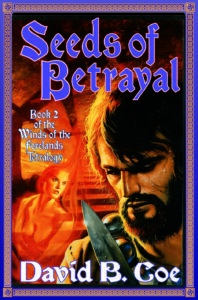 As I say, “trust your reader” is essentially the same as “trust yourself.” And editors use it to point out all those places where we writers tell our readers stuff that they really don’t have to be told. Writers spend a lot of time setting stuff up — arranging our plot points just so in order to steer our narratives to that grand climax we have planned; building character backgrounds and arcs of character development that carry our heroes from who they are when the story begins to who we want them to be when the story ends; building histories and magic systems and other intricacies into our world so that all the storylines and character arcs fit with the setting we have crafted with such care.
As I say, “trust your reader” is essentially the same as “trust yourself.” And editors use it to point out all those places where we writers tell our readers stuff that they really don’t have to be told. Writers spend a lot of time setting stuff up — arranging our plot points just so in order to steer our narratives to that grand climax we have planned; building character backgrounds and arcs of character development that carry our heroes from who they are when the story begins to who we want them to be when the story ends; building histories and magic systems and other intricacies into our world so that all the storylines and character arcs fit with the setting we have crafted with such care.
And because we work so hard on all this stuff (and other narrative elements I haven’t even mentioned) we want to be absolutely certain that our readers get it all. We don’t want them to miss a thing, because then all our Great Work will be for naught. Because maybe, just maybe, if they don’t get it all, then our Wonderful Plot might not come across as quite so wonderful, and our Deep Characters might not come across as quite so deep, and our Spectacular Worlds might not feel quite so spectacular.
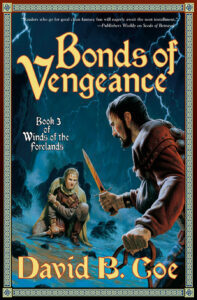 And that would be A Tragedy.
And that would be A Tragedy.
Okay, yes, I’m making light, poking fun at myself and my fellow writers. But fears such as these really do lie at the heart of most “trust your reader” moments. And so we fill our stories with unnecessary explanations, with redundancies that are intended to remind, but that wind up serving no purpose, with statements of the obvious and the already-known that serve only to clutter our prose and our storytelling.
The first few hundred pages of Rules of Ascension, the first volume of Winds of the Forelands, is filled to bursting with unnecessary passages of this sort. I explain things again and again. I remind my readers of key points in scenes that took place just a dozen or so pages back. I make absolutely certain that my readers are well versed in every crucial element (“crucial” as determined by me, of course) in my world building and character backgrounds.
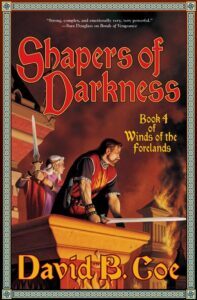 As a result, the first volume of the series was originally 220,000 words long. Yes, that’s right. Book II was about 215,000, and the later volumes were each about 160,000. They are big freakin’ books. Now, to be clear, there are other things that make them too wordy, and I’m fixing those as well. And the fact is, these are big stories and even after I have edited them, the first book will still weigh in at well over 200,000 words. My point is, they are longer than they need to be. They are cluttered with stuff my readers don’t need, and all that stuff gets in the way of the many, many good things I have done with my characters and setting and plot and prose.
As a result, the first volume of the series was originally 220,000 words long. Yes, that’s right. Book II was about 215,000, and the later volumes were each about 160,000. They are big freakin’ books. Now, to be clear, there are other things that make them too wordy, and I’m fixing those as well. And the fact is, these are big stories and even after I have edited them, the first book will still weigh in at well over 200,000 words. My point is, they are longer than they need to be. They are cluttered with stuff my readers don’t need, and all that stuff gets in the way of the many, many good things I have done with my characters and setting and plot and prose.
I have always been proud of these books. I remain so even as I work through this process. People have read and enjoyed all five volumes as originally written despite the “trust your reader” moments. I actually think most readers pass over those redundant, unnecessary passages without really noticing them. They are not horrible or glaring (except to me); they’re just annoying. They are rookie mistakes, and so I find them embarrassing, and I want to eliminate as many as possible before reissuing the books.
 But our goal as writers ought to be to produce the best stories we can write, with the clearest, most concise narratives and the cleanest, most readable prose. “Trust your reader” moments are a hindrance — one among many — to the achievement of that goal, and so we should be aware of the tendency and work to eliminate these unnecessary passages from our writing.
But our goal as writers ought to be to produce the best stories we can write, with the clearest, most concise narratives and the cleanest, most readable prose. “Trust your reader” moments are a hindrance — one among many — to the achievement of that goal, and so we should be aware of the tendency and work to eliminate these unnecessary passages from our writing.
Mostly, we should remember the translation — “trust your reader” means “trust yourself.” Chances are we have laid our groundwork effectively, establishing our worlds, developing our characters, setting up our plot points. If we haven’t, a good editor will tell us so and will recommend places where we can clarify matters a bit.
So, remember that less is usually more, that showing is almost always better than telling, that most times when we stop to explain stuff we rob our stories of momentum.
And most of all, remember to trust yourself. You’ve earned it.
Keep writing.
May 8, 2023
Monday Musings: Mental Health and My Complacency — A #HoldOnToTheLight Post
 I should have enjoyed last week. We had the release of The Chalice War: Stone, the first book in my new Celtic-themed urban fantasy. Lots of spring migrants (talking ’bout birds here) moved through our area of the Cumberland Plateau, so I had plenty of good bird sightings. The weather was cool and clear (mostly), and my morning walks were crisp and golden. As I say, it had all the makings of a fine week.
I should have enjoyed last week. We had the release of The Chalice War: Stone, the first book in my new Celtic-themed urban fantasy. Lots of spring migrants (talking ’bout birds here) moved through our area of the Cumberland Plateau, so I had plenty of good bird sightings. The weather was cool and clear (mostly), and my morning walks were crisp and golden. As I say, it had all the makings of a fine week.
Yet, it was one of the most difficult weeks of my entire life. And most of the difficulties were of my own making.
I’m not going to go into details as to what happened, or where our family conversations went. Suffice it to say, I did and said some stupid things and hurt both my daughters, two of the three people in this world (along with Nancy) about whom I care most. But the issues in question went far beyond my foolishness in the moment, to encompass deeper matters that go back several years. In a sense the immediate crisis triggered a reckoning with longer-term issues. And that was the painful part.
I have made no secret of the fact that I suffer from generalized anxiety disorder and panic disorder. These conditions have plagued me for much of my life, though I have only identified them and started working to come to terms with them over the past few years. I have been in therapy, I have read about anxiety disorders, I have tried to work into my routines various coping mechanisms. In short, I have taken the process seriously, and have worked at making myself healthier.
To a point.
Life has been challenging and complicated these past couple of years. Much of the mental health work I have done has been geared toward getting myself onto solid emotional ground, enabling myself to get through the day, to be productive in my work, to be functional in social settings. And yes, these are reasonable goals. No one can fault me for wanting any of those outcomes.
The problem is, at some point in the process, I became satisfied with those goals AND those results. I made them not just my immediate aims, but my ultimate ones. And as I found that solid footing, those productive days, the ability to navigate social settings, I settled in to a more comfortable approach to my therapy. I allowed my goals to shift to maintenance of the improvements I had managed to make in my life. I lost sight of the more distant — and more difficult — aims of my mental health regimen.
And so this week, as the crisis with my daughters deepened, I found myself confronted by a reality I had ignored and forgotten in recent months.
Namely this: As with the mental health issues of so many, mine are not just about me. They are about the people in my life, the people who have to coexist with me, who deal with my anxiety and its manifestations on a daily basis. I am not the easiest person to be around under the very best of circumstances, but when my GAD kicks in, or when I hover at the edge of a panic attack, my anxiety can be disruptive for everyone around me. Since I tend to be especially prone to my anxiety problems when I travel, or at times when we are interacting with a lot of people, like at holidays, my kids often have a front row seat to my worst moments.
It became clear to me this past week that I had grown complacent with my therapy and the rest of the mental health work I do. I might have been maintaining an easy middle ground that allowed me to function in most says, but that same middle ground had not yet addressed the deeper problems that have impacted the lives of my spouse and my children. I needed to be reminded of this, and for that I feel badly. I should have known better.
But the important thing is I’ve learned the lesson and taken it to heart. I have already been in touch with my therapist and have arranged to resume more frequent sessions. I intend to work on some potentially curative protocols that will be more demanding, more tiring, but which could make big differences in my daily life and in these crucial relationships. And I am considering other possible remedies as well.
More to the point, I have vowed to my family — and I now vow to you as well — that I will do whatever is necessary to improve my mental health, to make myself an easier person to be around, and to be a better father and husband and friend.
Because here is the fundamental point. It wasn’t merely complacency that held me back. It was fear as well. Fear of the hard work, fear of the difficult revelations that may lurk ahead of me, fear of the emotions I know I will have to wade through to reach the other side. And because of the fear I was not only short-changing my loved ones, I was short-changing myself. I was doing less than I could for me, and so was settling for less emotional health than I deserve.
No more.
I offer this glimpse into my private health in the hope that perhaps others in similar situations and predicaments might find my experience illustrative. If that’s you, I hope this has helped.
Have a great week.
May 3, 2023
Professional Wednesday: Learning From Each of Our Projects
Ideally, every new book and story we write is not just an adventure in imagination, a chance to discover new characters and settings and narratives, but also a learning opportunity. I continue to improve my writing with each project, and I try to do at least one thing new with each story or novel. For instance, while working on my short story for the Dragonesque anthology, which will be published later this year by Zombies Need Brains, I was aware that my editors (and good friends), Joshua Palmatier and S.C. Butler, both tend to cut out a few dialog tags from all the stories they edit. I was determined to make that impossible for them. And I wound up managing to write the entire story using only a single instance of “said” or “asked.” Let them find something else to cut! In doing this, I actually made the story leaner, more concise, and more fun to read.
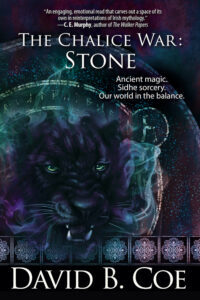 With this in mind, I thought it might be helpful to list a few things I learned, reminded myself of, and/or tried to do differently while writing my Chalice War trilogy, which debuts on Friday, May 5 (THIS FRIDAY) with the release of The Chalice War: Stone from Bell Bridge Books.
With this in mind, I thought it might be helpful to list a few things I learned, reminded myself of, and/or tried to do differently while writing my Chalice War trilogy, which debuts on Friday, May 5 (THIS FRIDAY) with the release of The Chalice War: Stone from Bell Bridge Books.
Journal about, well, everything: The first book in the Chalice War series includes a frenzied chase/trek across the U.S., and a series of climactic scenes that are set in Las Vegas. The second book is set in Australia — in Sydney, as well as in the tourist town of Kiama along the Illawarra coast. The third book is set in Ireland. I have driven across this country a few times, and I’ve been to all the places I just mentioned. I have driven into Vegas at night, approaching from the east, as my characters do. I have spent time along the Irish coast (although not quite the same part). I have spent a good deal of time in Kiama.
And I have journaled about all of these experiences. While writing descriptive passages for the books, I drew heavily on old journal entries (and also on my old photographs). I’ll admit this is not the first time I have drawn upon personal experiences and writings for this sort of thing. When I wrote the Fearsson books, I consulted journal entries from visits to the Sonoran Desert. Whenever I write in the Thieftaker world, I draw on old entries from my college years in New England. This is not a new lesson, so much as something I was reminded of while writing the Chalice books. But the value of the point is undeniable. The more we write, the better we get, and journaling helps us keep in practice, which is reason enough to do it. But it can also be a terrific source for material that we can adapt to our fiction, be it in the form of descriptive writing, character development, or even plot points.
Dude, lighten up: My books tend to be very serious. Bad things happen all the time to good people. The fate of the world hangs in the balance again and again and again. It’s kind of like Buffy’s tombstone from the finale of the fifth season of Buffy The Vampire Slayer — “She saved the world. A lot.” I’m not suggesting this is a bad thing. People return to my books because I keep the stakes high, and they like that.
And the stakes could not be higher in the Chalice War books. The fate of our world is balanced on a knife’s edge throughout all three volumes. Serious stuff.
But people who know me know that I enjoy laughing and that I joke around a lot. And in these books, really for the first time in my career, I rely heavily on humor. I won’t go so far as to call the books “light-hearted” or “romps” — the series is action-packed, and, as I say, the stakes could not be higher. Still, there is a lot in these pages that made me laugh as I wrote, and I expect the books will make my readers laugh as well. A lot.
Limit the number of POV characters: Early in my career, when I wrote my big, fat epic fantasies (The LonTobyn Chronicle, Winds of the Forelands, Blood of the Southlands), I used a vast array of point of view characters. I was writing big sweeping stories and had a cast to match. I went from those to Thieftaker and Fearsson, which both had, basically, one POV character (the first chapters of the second and third Fearsson books were written in other POVs, but then both books reverted to Jay). Noir-style mysteries, I felt, worked best when told from the perspective of the investigator. Later books (Islevale, Radiants) fell somewhere in between — more than one, but not as many as those huge stories I told early on.
With this newest trilogy, I tried something a little different. I needed more than one POV character, but I wanted to have a maximum of three in each book. And that’s pretty much what I did. Chapter one of books I and II are from different POVs, but after that I have two POV characters in Stone, the first book, and three POV characters in the others.
And I like the way the novels read with limited casts of this sort. There is enough variety in the voices to propel the books forward with each POV shift, but there are few enough narrators that my readers can grow comfortable with the characters and their personalities. Obviously, every story is different, and what works with one series won’t necessarily work with another, but going forward, I will look for opportunities to limit my cast of narrating characters to more manageable numbers.
I hope you will check out the new series. I really do believe you’ll enjoy the books.
In the meantime, keep writing!
May 1, 2023
Monday Musings: This Blog, My Books, Your Support
This Blog:
I want to say from the outset that I love maintaining this blog. I write my twice-weekly posts because I enjoy sharing my thoughts (on Mondays) and my writing tips (on Wednesdays). Writing on demand in this way is always good practice. Delving into various issues with the Musings posts often is therapeutic for me, and forcing myself to think about different craft issues on a weekly basis helps me continue to hone my own writing skills.
I will also admit, though, that maintaining the blog is time-consuming. Some weeks, the posts flow pretty easily. Other weeks, not so much. It can take me a full day to write the two essays, occasionally more than a day. That’s fine, too. As we all know, writing can be like that — easy one week, excruciating the next.
To state the obvious, I am not compensated in any way for my blogging. That has been by choice, and I do not intend to place a paywall between my readers and the content on my blog. That, I fear, would change the dynamic between my blogging and reader response to my posts, which feels very organic right now. I want to keep it that way. I have thought, though, about creating a Patreon (for those unfamiliar with Patreon, it offers creators a chance to gain financial backing from subscribers) and asking people to contribute voluntarily. If every person who visited my blog and every person who subscribed to it gave just one dollar per week, that would be ample compensation.
As I say, it’s something I’ve considered. But . . . .
My Books:
As I’ve already said, I maintain the blog because I enjoy doing so. But, to be perfectly honest, I also do it to bring traffic to my website. The calculus is a little convoluted, but it goes something like this: If people come to my site to read the blog, maybe they will stick around and look at the other pages. And if they look around, maybe they’ll become interested in my books, and maybe they’ll start buying and reading those books. As marketing strategies go, it is neither brilliant nor revolutionary, but I’m a fantasy writer, not a Madison Avenue executive, and it’s the best I’ve got.
And so, I am a little reluctant to set up a Patreon because in a way I already ask you for a financial contribution, don’t I? I make no secret of my desire for you to read my books. I write about them in my blog posts, I refer to them in my social media posts, I talk them up and even hand-sell them at the conventions I attend. If someone were to ask you, “What do you think David B. Coe wants from you?” you probably wouldn’t have to think too long and hard before coming up with, “Well, I guess he would like me to buy his books when they come out.”
 Let’s back that up with a little math. I said a moment ago that, were I to start a Patreon, I would be happy with contributions of $1.00 per week, which comes to $52.00 for the year. Now, as it happens, I have the first book of a new trilogy coming out on Friday of this week, May 5th. This is The Chalice War: Stone, the first book in my new Celtic urban fantasy from Bell Bridge Books. The second book, The Chalice War: Cauldron, will be out in June, and the third book, The Chalice War: Sword, will be out soon after that. Each printed book lists for $17.95. Factor in sales tax, and the three books together would cost about $57 or $58, or about $1.12 per week. (If you read ebooks, the three together will cost a total of about $16, or $0.31 per week. What a bargain!!)
Let’s back that up with a little math. I said a moment ago that, were I to start a Patreon, I would be happy with contributions of $1.00 per week, which comes to $52.00 for the year. Now, as it happens, I have the first book of a new trilogy coming out on Friday of this week, May 5th. This is The Chalice War: Stone, the first book in my new Celtic urban fantasy from Bell Bridge Books. The second book, The Chalice War: Cauldron, will be out in June, and the third book, The Chalice War: Sword, will be out soon after that. Each printed book lists for $17.95. Factor in sales tax, and the three books together would cost about $57 or $58, or about $1.12 per week. (If you read ebooks, the three together will cost a total of about $16, or $0.31 per week. What a bargain!!)
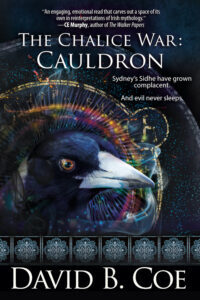 So, for about what you might give to a Patreon, you could have all the blog posts AND all three books in the new series.
So, for about what you might give to a Patreon, you could have all the blog posts AND all three books in the new series.
And so . . . .
Your Support:
Yes, with a Patreon, most of the money goes directly to the author. When you buy our books, we authors get a much smaller share of the proceeds. And yet, most authors I know would make that trade every day of the week and twice on Sunday. Why? Because we write! Because we LOVE to write! Because we have new ideas that we are eager to write and have published!
Much that we hear about the publishing industry sounds arcane and confusing, and many of us respond to elements of the business with amazement and dismay, wondering why anyone ever chose to set up an entire sector of the economy in quite this way. But boiled down to its most basic elements, the business model is pretty straightforward. Authors write books, publishers put out those books, readers purchase and read those books. And if all goes as it should, and readers do their part, authors get to write and publish more and more books. Lather, rinse, repeat.
Which brings me, at long last, to my point. I need for you to buy my books. It really is that simple. If you like the blog — if you navigate to my page on Mondays and Wednesdays, or if you subscribe to my feed and the posts come to your inbox — you know how much I love to write. I love it so much I do it for free twice every week. But I can only do that if the books move off the shelves and I get to write and publish more of them.
Your support is vital, not just for me, but for every author whose work you care about. Stories matter. The written word matters. Today, more than ever before. All over the world and, sadly, all over our country, self-expression is under assault from those who fear ideas. All over the world, and all over our country, literature is dying a death of a thousand cuts: book bannings, apathy, the allure of gaming and television and social media. Books and authors need the passion and commitment of readers, just as readers need the passion and commitment of writers.
And, to state the obvious, authors need to make a buck. This is our passion, our obsession, our craft and art. It is also our livelihood.
So, please, enjoy my blog posts. If you’ve missed any recently, feel free to go back and read through the archives. And take a look around the site. Make yourself at home, and rest assured that I’ll be back with another post on Wednesday, and with more in the weeks to come. But also please consider that when you buy my books, and those of other authors, you not only get those stories, you also make possible all the content we make available to you.
Thanks for reading this. Have a great week.



